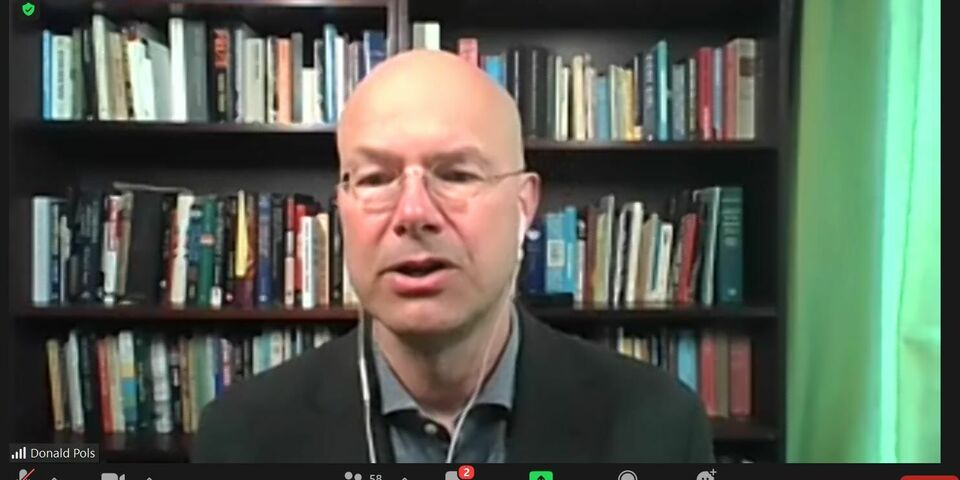TU/e students and Milieudefensie discuss Shell case
On May 26, Dutch environmental group Milieudefensie (Friends of the Earth Netherlands) finally won a protracted lawsuit against Shell. The Hague District Court ruled that the multinational has a global responsibility to cut CO2 emissions faster and over a shorter period of time. A historic moment, because for the first time in history a company was ordered to bring its policy in line with the Paris Climate Agreement. This makes the case extremely interesting to students of the bachelor’s course ‘Industrial Ecology.’ On Tuesday 22 June, they discussed the case with key figures in the organization of Milieudefensie.
“The course Industrial Ecology offers first-year students a broad introduction to the theme of sustainability and the related energy transition,” says Bart Wesselink, who teaches the course at TU/e. “Throughout the year, I’ve organized several guest lectures during which I yielded the floor to students and allowed them to ask the speakers questions. I worked at Milieudefensie for a few years, and with that background and some help of others I managed to convince the key figures in the lawsuit to give the students a guest lecture.”
One of those key figures is Donald Pols, director of Milieudefensie. The picture of him rejoicing with tears of happiness after the court ruled in favor of Milieudefensie was shared globally. “It was a moment of emotional release. We’ve been working on this case for five years, and you can’t show any results for five years until that moment. It was relief, it was triumph, it was everything. This is my work, but I’m a father first, and I worry deeply about my children’s future,” says Pols during the online meeting with over fifty students. His colleague Nina de Pater, who was responsible for the substance of the case, has also joined the online meeting, and she too remembers that moment vividly. “This was probably the highpoint of my career, even though I’ve only just started.” De Pater obtained her master’s degree in Environmental Sciences at Wageningen University in 2018.
Questions from students
After a brief introduction by Pols and De Pater and a reminder of what the case was all about, the floor was yielded to the students. Questions quickly started to pour in. Mirko Bolsenbroek wondered whether Milieudefensie felt any doubt during the process. “Didn’t you think at a certain moment: Shell has some good points?” Pols answered: “No, I’ve never had any doubts about our case. It feels strange, standing opposite a large multinational like Shell, actually there were times when they didn’t see our arguments and defense coming. It seemed liked the other way around.” De Pater adds: “This case is the first of its kind, we had no example and therefore we couldn’t compare it to anything. I was very nervous on the day of the ruling because we weren’t sure whether the judge would have the guts to make a ruling in our favor.”
Precedent
Student Thomas Fransen mostly wants to know what kind of precedent was set by the judge with this ruling. “Has it become easier for the organization to bring multinationals in a polluting industry to court?” Pols thinks it has. “This case created a serious risk to other large companies in this industry. Shell really needs to abide by these agreements because they are binding, and the company also feels the pressure from its shareholders, naturally.” Pols refers to the Urgenda case as an example, where the Dutch State was ordered to make a greater effort to reduce greenhouse gas emissions. “This too was a unique case that led to several initiatives and preparations for new court cases. We expect a similar effect after this case, because many of the issues on which the court ruled in favor of Milieudefensie during the Shell case, also apply to environmental lawsuits worldwide. This gives organizations and citizens more courage to actually take cases to court.”
In line with this, Tom Siebelt wants to know what will happen next, also when it comes to investments. “There is a fear that Shell will sell part of its polluting industry. However, that’s easier said than done, because the ruling is valid all over the world. Investors are therefore at a great risk, and they will ask themselves whether such an investment is of interest to them in the long term,” De Pater says.
‘This is big’
Lastly, Meie Kleijburg wonders whether Shell can appeal the court’s decision. “Whatever happens, suppose that Shell goes to court again and Milieudefensie ceases to exist tomorrow, the first step towards change has been taken. It’s not just about achieving the targets that were set by the judge, but about taking a first step towards the transition to renewable energy. This is big,” Pols says.
Memory refresher
The climate case against Shell was brought by Milieudefensie (Friends of the Earth Netherlands), along with six other organizations, including Greenpeace, Fossielvrij NL and the Waddenvereniging, and 17,000 individual claimants. The judge ordered Shell to do much more to prevent dangerous climate change. The multinational has to cut its CO2 emissions by 45% in 2030, compared to 2019 levels. Before the ruling, Shell’s aim was to cut emissions by a minimum of 20% by 2030 and by 45% by 2035.






Discussion